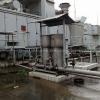|
|
Impurities In Crude Oil
#1

Posted 22 November 2012 - 01:44 PM
During shutdown in mid stream (Processing/separation of Water, Salt, Oil and Gas from the crude oil obtained from different field (Well)) ,we found some sludge and some solid particle in three phase separator, electrostatic dehydrator and electrostatic desalter , after that we send these samples for analyzing in which we found following particles.
Quartz (SiO2)
Halite (NaCl)
Anhydrite (CaSO4)
Magnetite (Fe3O4)
Calcite (CaCO3)
Microcline (KAlSi3O8)
Pyrite (FeS2)
Trace metals V, Ni, Fe
Now i have some queries from the above.
1. What should be normal range for the same in crude oil?
2. What is the effect from the above particles in operation/plant?
3. How can we controlled to enter in the plant?
Kindly reply me for the same.
Thanking You,
Regrads,
SS
#2

Posted 22 November 2012 - 11:24 PM
1. Composition of crude oil varies from region to region. It is difficult to generalize. Some idea about crude oil composition may be obtained from the link below:
http://www.cheresour...n-of-petroleum/
2. High metal content causes poisoning of catalysts in catalytic processes for treatment of crude oil fractions. Materials like silica (Quartz0 will cause fouling and scaling of processing equipment used for crude oil processing in a petroleum refinery. Pyrites can cause fire inside processing equipment due to their property of auto-ignition given the right conditions.
3. There are many processes for solid / sludge removal from crude oil such as filtration, desalting, liquid-solid cyclones, sedimentation etc. Again the choice of method for solids / sludge removal depends on the type of solids / sludge, their qunatity and the economics of processing the crude oil in a given location.
Hope this helps.
Regards,
Ankur.
#3

Posted 25 November 2012 - 11:22 AM
Many thanks for you reply,
Regards,
SS
#4

Posted 25 November 2012 - 11:48 AM
Thanks
#5

Posted 25 November 2012 - 12:39 PM
If you use the search feature of the forum you will find a lot of information related to the items you have mentioned. Also google for these items and you should find a lot of information.
Additionally the following books are recommended for upstream / midstream oil & gas:
1. Surface Production Operations - Volume 1 & 2 by Ken Arnold & Maurice Stewart
2. Petroleum Engineering Handbook - Vol. 1 to 7 by Larry W. Lake
3. Petroleum & Gas Field Processing by Abdel-Al, Aggour & Fahim
4. Standard Handbook of Petroleum & Natural Gas Engineering by William C. Lyons
5. Petroleum Engineering Handbook - Society of Petroleum Engineers (SPE) - Editor: Howard B. Bradley
6. Handbook of Offshore Engineering - Vol. 1 & 2 by Subrata Chakrabarti
Hope this helps.
Regards,
Ankur.
#6

Posted 27 November 2012 - 11:10 AM
Thanks
#7

Posted 28 April 2013 - 03:16 AM
sandy38813,
If you use the search feature of the forum you will find a lot of information related to the items you have mentioned. Also google for these items and you should find a lot of information.
Additionally the following books are recommended for upstream / midstream oil & gas:
1. Surface Production Operations - Volume 1 & 2 by Ken Arnold & Maurice Stewart
2. Petroleum Engineering Handbook - Vol. 1 to 7 by Larry W. Lake
3. Petroleum & Gas Field Processing by Abdel-Al, Aggour & Fahim
4. Standard Handbook of Petroleum & Natural Gas Engineering by William C. Lyons
5. Petroleum Engineering Handbook - Society of Petroleum Engineers (SPE) - Editor: Howard B. Bradley
6. Handbook of Offshore Engineering - Vol. 1 & 2 by Subrata Chakrabarti
Hope this helps.
Regards,
Ankur.
hello sir
good day to you. can you please upload the above books or send me the download link if possible.
thank you
#8

Posted 28 April 2013 - 01:48 PM
Hi,
In addition to Mr. Ankur comment, these can cause the fouling, scaling (heat exchanger), at upstream level you can reduce the sludge and salt content. there are many thoughts around this. you can google it.
regards
Similar Topics
Basic Dynamic Simulation Of A Crude Distillation UnitStarted by Guest_tomr91_* , 12 Jan 2025 |
|

|
||
Sugar Impurities After Distilling Ethanol FuelStarted by Guest_vyse_* , 14 Nov 2024 |
|

|
||
Heavy Crude PumpStarted by Guest_Rahimzadeh_* , 13 Apr 2024 |
|

|
||
Quantitative Risk Assessment Of Onshore Crude Oil PipelinesStarted by Guest_Mansi_* , 14 Feb 2024 |
|

|
||
Crude Oil Storage CapacityStarted by Guest_Noman97_* , 19 Jan 2024 |
|

|

 FB
FB









